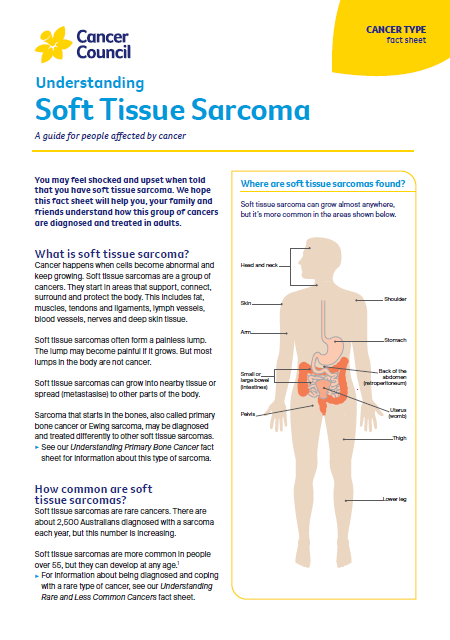- Home
- Soft tissue sarcoma
- Life after treatment
Life after treatment
Find out how to cope with life after treatment for soft tissue sarcoma, including emotional changes and adjusting to a new normal.
Learn more about:
For your community
Overview
There is no right way to feel if you have been diagnosed with a cancer such as soft tissue sarcoma. Feeling a range of emotions is normal and you may feel anxious, fearful, angry or lonely. Many people need emotional support before, during and after treatment, particularly if they have major surgery like an amputation or a lot of tissue is removed. Adjusting to living with visible scars, changes to your physical appearance, changes to your lifestyle and bodily function can be hard and take time.
It can help to talk things through with a counsellor, psychologist, friend or family member. Talk to your medical team or call Cancer Council 13 11 20 about what support services are available.
Learn more about emotions and cancer.
Practical and financial support
There are many services that can help you manage with practical or financial issues caused by having cancer. Benefits, pensions and hardship programs can help pay for prescription medicines (for example the Australian Government’s Pharmaceutical Benefits Scheme [PBS]), transport costs or utility bills. Ask the hospital social worker which services are available in your area and if you are eligible.
For additional income, you may be able to access your superannuation early in certain circumstances, or claim on insurance policies such as income protection, trauma, and total and permanent disability (TPD).
Managing your ability to work or study, particularly during cancer treatment, is important to consider and will depend on your personal situation.
Learn more about cancer and your finances and cancer, work and you.
If you need legal or financial advice, you should talk to a qualified professional. Cancer Council offers free legal and financial services in some states and territories for people who can’t afford to pay – call 13 11 20 to ask if you are eligible.
Follow-up appointments
You’ll have regular appointments for at least 5 years to check that the sarcoma hasn’t come back. These appointments may include scans (such as MRI, CT and/or PET) and physical examinations. At first, it’s common to have scans of the affected area regularly. You may also have a chest CT or x-ray, as the lungs are the most common place for sarcoma to spread to.
Tell your doctor if you notice a lump, swelling or any health problems between appointments. Some cancer centres give you a survivorship care plan.
This outlines times for appointments and follow-up tests, symptoms and long-term side effects to look out for, support for medical or emotional problems, and tips for staying healthy. If you don’t have a survivorship care plan, ask your specialist for a written summary of your cancer treatment, and give a copy to your GP and other doctors.
Learn more about living well after cancer.
If the cancer comes back
Sometimes soft tissue sarcomas come back after treatment, which is called a recurrence. This is why regular follow-up appointments are important – they help find the cancer early if it does return.
If sarcoma does come back, treatment will depend on where the cancer is, the type of sarcoma, and what treatment you’ve already had. Options may include surgery, chemotherapy, immunotherapy, radiation therapy, targeted therapy or treatment as part of a clinical trial.
Learn more about palliative care, living with advanced cancer and facing end of life.
Find information on living well after cancer in Arabic, Greek, Simplified and Traditional Chinese, and Vietnamese.
Watch this video to see why eating well is so important after a cancer diagnosis, and what you can do to maintain a healthy diet.
Go to Settings ![]() to turn on auto-generated subtitles in your language.
to turn on auto-generated subtitles in your language.
Research shows that exercise benefits people with cancer during and after treatment. Find out more in this video or see our other exercise videos.
Go to Settings ![]() to turn on auto-generated subtitles in your language.
to turn on auto-generated subtitles in your language.
More resources
A/Prof Richard Boyle, Orthopaedic Surgeon, Royal Prince Alfred Hospital and Sydney Children’s Hospital Network, NSW; Catherine Chapman, Adolescent and Sarcoma Cancer Specialist Nurse, Canberra Health Services, ACT; Belinda Fowlie, Bone Tumour Nurse Practitioner Candidate, SA Bone and Soft Tissue Tumour Unit, Flinders Medical Centre, SA; Leanne Goegan, Consumer; Jonathan Granek, Consumer; Prof David Gyorki, Surgeon and Director, Sarcoma Service at Peter MacCallum Cancer Centre, VIC; Prof Angela Hong, Radiation Oncologist, Chris O’Brien Lifehouse, Melanoma Institute Australia, GenesisCare and Clinical Professor, The University of Sydney, NSW; A/Prof Yeh Chen Lee, Medical Oncologist, Prince of Wales Hospital and UNSW, NSW; Caitriona Nienaber, 13 11 20 Consultant, Cancer Council WA.
View the Cancer Council NSW editorial policy.

